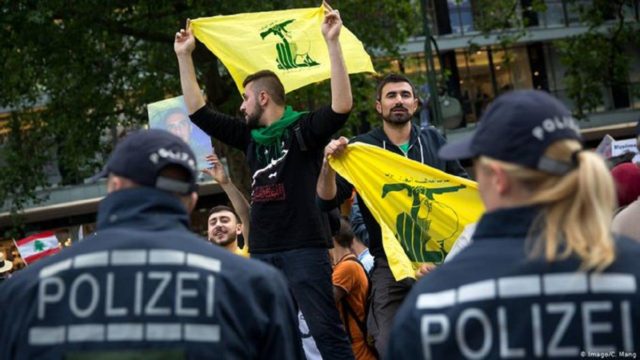
The Ban on Hezbollah Activities in Germany
Publication: Terrorism Monitor Volume: 18 Issue: 12
By:

The German Ministry of Interior Horst Seehofer announced on April 30 that the Lebanese organization Hezbollah would be fully banned from carrying out any activity on German soil. The announcement was followed by raids on four mosques and organizations suspected of being linked to Hezbollah, as well as some private addresses.
The move was a result of years of legal contemplation and pressure from the United States and Israel. Germany had banned Hezbollah’s terrorist activities already in 2013 as part of an EU-wide ban, but the designation was not applied to the wider organization. This balancing act was publicly criticized by Richard Grenell, the then-U.S. ambassador to Germany, according to whom the practice of distinguishing Hezbollah’s “armed” and “political” activities by Berlin and several other EU-countries was purely artificial.
Germany’s move came a year after all Hezbollah activities were banned in the UK. This led to renewed calls from German politicians for the total ban of all Hezbollah activity in order to ensure that it would not be able to raise funds in the country. These politicians cited Germany’s special responsibility to Israel because of Nazi-era atrocities against Jews. A motion to this end was put forward and was adopted by the German parliament in December 2019 (Tagesschau, December 19, 2019).
The April announcement of the total ban of Hezbollah was quite likely timed to curtail the anti-Israeli “al-Quds-Tag”, ie. “al-Quds-day” demonstration, organized by Hezbollah-supporters yearly since 1983 in Berlin on the last Saturday before the end of Ramadan. For Germany, these demonstrations, with Hezbollah flags and antisemitic and anti-Israeli paroles, have been a deep embarrassment (Berliner Zeitung, June 1, 2019).
The “al-Quds-day” demonstration mobilized up to 2,000 participants yearly. According to the German Security Service (BfV), Hezbollah has as many as 1,050 followers in Germany. These followers are organized through apolitical mosques, cultural associations, and clubs whose social media accounts and online websites openly advertise their association with Hezbollah, helping map the entities linked to the group (Bundesamt für Verfassungsschutz, April 30).
German security authorities reportedly also received help from their Israeli counterparts. The Israelies carried out a months-long intelligence operation to assess the group’s operations in Germany and presented their findings to the local intelligence and law agencies, including on key individuals in Hezbollah’s operations in the country, financial networks used to launder cash and transfer millions of euros into the terrorist group’s bank accounts, as well as the organization’s fundraising activities (Times of Israel, May 2).
While the branding of the entirety of Hezbollah is a dramatic departure from Berlin’s previous policy, it is not the first time Germany has acted against the organization. In 2008 German authorities denied a broadcasting license for the Hezbollah al-Manar TV-station (Deutscher Bundestag, January 1, 2009).
In 2014, the activities of the “Waisenkinderprojekt Libanon e.V.” association in Essen were banned. The association, established in 1997, was nominally working to alleviate the plight of orphans in Lebanon. However, the project had collected around three million euros across Germany and transferred these to an organization closely connected to Hezbollah (Bundesamt für Verfassungsschutz, April 8, 2014).
The police raids during the early hours of April 30 were conducted in order to ensure the “evidence of potential sub-organizations in Germany could not be destroyed when this ban was announced” (Bundesministerium des Innern, für Bau und Heimat, April 30).
Law enforcement authorities searched the premises of four associations: “Imam-Madi Zentrum” in Munster in the State of North Rhine-Westphalia; “Moschee-Verein El-Irschad e.V.” in Berlin-Neukölln; the “Al-Mustafa Gemeinschaft” in Bremen and the “Gemeinschaft libanesischer Emigranten e.V.”—an association of Lebanese immigrants—in Dortmund. Additionally, the heads of the associations’ homes were searched, resulting in the seizure of thousands of euros in cash, several computers and documents (Tagesschau April 30; Die Welt, May 10).
As a consequence of the new ban and the following raids, the organizers cancelled the “al-Quds-day” demonstration (Qudstag Jerusalemtag, May 13).
Germany’s decision to ban Hezbollah provoked protests from Iran and Hezbollah. Government spokesman Seyyed Abbas Mousavi criticized Germany for “ignoring the realities in West Asia,” claiming that Hezbollah “is a formal and legitimate part of [Lebanon’s] government and parliament” and has played a “key role in fighting the Islamic State terrorism in the region” (Iran Press, May 1).
Three days later, Hezbollah Secretary General Hassan Nasrallah criticized Germany for “giving in to U.S. and Israeli interests”. According to Nasrallah, “The German decision was expected and we expect other European countries to follow”, claiming that his organization had not been active in Europe for a long time (Al-Arabiya, May 4).
Then-U.S. Ambassador Grenell welcomed Germany’s decision and called on the rest of Europe to follow suit. Such action, however, is unlikely. France in particular, with its close historical ties to Lebanon, has been reluctant toward supporting a European-wide terrorism listing of all Hezbollah activities (Deutsche Welle, April 30). Nevertheless, for Hezbollah, Germany’s decision is a political blow to its attempts to present itself as a legitimate actor. With Germany now joining Britain and Netherlands in a tougher stance on Hezbollah, it is possible that some EU-countries will follow suit and help set a precedent for further restrictions by other international actors.




